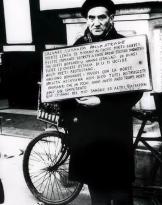Finally in the night between the 17 and 18 May 1942, with favorable weather conditions, Carmelo embarked in Portopalo (Siracusa) on the MTSM 2141 of the Tenth Flotilla Mas. The squadron of "MTSM" based in Augusta was placed under the command of the lieutenant of vessel Ongarillo Ungarelli, and carried out incessant attacks in the waters of Malta. Ungarelli wanted to accompany the young "sabotatore-informatore" in person, assisted by the sub-driver Arnaldo de Angeli. Given the importance that was given to the mission, their small hull, to which another was aggregated MTSM, 218, he was escorted by the torpedo boat Abba and come on Mas 451 e 452 up to "safe distance", then i MTSM 214 e 218 they continued on their approach route with the engines idling. First, fromMTSM 218, the diving diver Giuseppe Guglielmo, an excellent swimmer of the "Gamma" group of the Tenth, approached the rocky coast of the Marsa Scala bay, in the south-eastern part of the island, was disembarked on an inflatable boat (called turkey). with the task of exploring it and detecting defensive preparations: obstructions, barbed nets, machine-gun nests, posts, etc. Unfortunately, he disembarked on the coast, delayed taking notes and sketching and could not return to his "MTSM", despite having this expected half an hour past the scheduled appointment, while the first dawn lights already appeared. William was later taken prisoner by the British.
In the meantime theMTSM 214 he continued his slow-moving course, because the phosphorescent wake of the motorboat if it had been launched at a more sensitive speed would have been easily detected by the reflectors that swarmed the waves; the small motorboat stopped about 150 meters from the cliff, in the cove of Ras Id-Dawara, under the precipice of Had-Dingli, (cirda 260 meters in height).
The point of landing had been chosen by Borg Pisani himself: that cala opens on the south-western coast of the island, a rocky and steep coast south of Casal-Dingli, (in view of the small island of Filfola); under the cliff opens a sea cave that Carmelo knew well, as he had arrived there several times in his daring adolescent excursions. This particular was ignored by some historians who told the story of Carmelo Borg Pisani, coming to talk about "... a business conceived badly and implemented worse" in an inaccessible area. On the other hand, it is known from more well-documented historians that Carmelo had climbed the rock wall several times, during his teenage excursions and had reached that very cave.
The goals of the mission were manifold: to discover the movements of a phantom ship, which, by avoiding all surveillance, carried small but regular supplies to Malta at night; inform about the food and moral situation of the troops and the population; find out if there were radio or radar installations on the rock of Filfola and on the islet of Comino; discover the military objectives on the island of Gozo.
Carmelo transshipped on the airship and, the same night, without being noticed, after a short exploration, landed inside the cave and dumped a flat, dry, 4 container with water and water containers for 20 days, a gun , a hand grenade, ammunition, radio-transmitting radio, cipher, batteries, medicines, some rolls of rope, gasoline "and finally banknotes for an amount of about 200 pounds, useful to compensate those who had helped".
It goes without saying that if the young volunteer had not had a precise knowledge of the places could not trace a sea cave at night, and instead more than one writer charges the "superficiality", or worse "the bad conscience" of those who planned the mission the tragic failure; a denial can be made of the same statements by Stefano Fabei on page 92 when he records that the same captain of frigate Max Ponzo, who had been put in charge of the Office D, the special sector of the SIS (the Secret service of the Navy) delegated to the preparation and establishment of an information cell in Malta, he moved from Rome to Porto Palo to follow the practical radio telegraphy exercises of Carmelo Borg Pisani, assisted by two non-commissioned non-commissioned officers. Stefano Fabei admits "Ponzo with the staff of the mission remained in Porto Palo awaiting the start of the operation During his stay in that location the training of the informant was taken care of in the smallest details in order to achieve maximum physical efficiency and professional essential for the activity to be carried out.The equipment and materials necessary for the mission were also prepared and checked very carefully ". The same captain of frigate Max Ponzo wanted to embark on the torpedo boat Abba who was escorting the flotilla bound for Malta, it should also be emphasized, as will be recalled, that the second lieutenant Ungarelli, commander of the "MTSM" squadron based in Augusta, wanted to board the motorboat carrying Carmelo, as he also admits Fabei on page 94. But there's more: the same rigorous and well-informed Fabei accurately reported on page 88: "The military-technical training course he followed in Messina had to provide him with the necessary skills to move with a certain ease in an area fraught with roughness and the use of the equipment that would have been given to him. In theory Borg Pisani should not have had any major problems moving, apart from his strong myopia, as he had loved climbing cliffs since he was a boy. peak along the coast and explore the caves created by the corrosion of the waves. He knew many of the most hidden ravines of the island which he had taken in suggestive photographs ".
However, it is true that very serious responsibilities are to be attributed to Italian Secret Services and to the Major States for not having prepared an adequate network of informers in Malta already before the conflict, a serious deficiency that unfortunately also occurred in all the other fields of action abroad.
But the rough sea strengthened; an anomalous wave ripped him away, jeopardizing his own life. Much of the material in the watertight containers was later found by the British.
For two long days he tried to find a way to climb the overhanging wall; he no longer had the boat, but even when he was swimming he was able to find an access that allowed him to cross the cliff wall. Yet he remembered having traveled more than once in his teenage raids. Evidently the sea had demolished some protrusion in the course of those years, making the wall inaccessible from the sea.
He was exhausted, fasting, thirsty, destroyed by fatigue.
To the denial of those who believed that Carmelo Borg Pisani was not sufficiently prepared and gifted, it should also be noted, with regard to training, that Carmelo had become a good swimmer, excellent one would say; in fact he had passed very well the terrible trial between the waves of the strong waves inside the cave with the danger of being thrown on the protrusions of the walls, not only, but then brought to the outside, had resisted swimming for almost two days, looking for a way of landing to the steep wall to peak.
But Stefano Fabei presses, on page 100 of the work cited, that: "the adverse fate wanted to have landed in the least suitable place", forgetting what we read on page 103: "He reported that the landing point had chosen him himself based on the fact that the area was poorly guarded ". For those who ignore the fact that Carmelo well knew that cave and the passage to get there by land, it may certainly seem strange that it was made to land on that site, but Fabei himself reiterated - as we have seen - the statements of more careful biographers to this particular.
After three days of vain attempts, the stressed, exhausted, thirsty, hungry Hero decided to ask for help; was heard by a certain Robert Apap who reported it to an English observation post located nearby. A motor lifeboat was sent Royal Air Force, that gathered him clinging to a rock. Taken in extreme conditions, he was taken to Kalafrana and from there he was transferred by ambulance to the Mtarfa military hospital, where he attempted to pass himself through Gaius Borghi, but the Anglo-Maltese medical captain Tommy Warrington, who had been his neighbor and a playmate in Senglea, he recognized him and denounced him, with the exasperated rancor of the renegades, thus giving certainty to the persistent doubts of the English on this strange "castaway". Carmelo, on the other hand, a candid and loyal soul, incapable of imagining perfidy, believing that the Maltese childhood friend, who pretended to have kept intact the ancient frank and affectionate friendship, would have protected him2he confided himself ingenuously to his old companion, who, while he was still showing him his friendship, perfidiously clutched his halter around his neck. Warrington "brought him brandy, buttered bread and tea" and entertained him cordially for a long time, "up to three in the night", in intimate and "affectionate" reconciliation, inciting him callidely to tell how many more details he could and that he later reported in detail to counterintelligence dell 'Intelligence Service and that he also confirmed, implacably, in court.
Carmelo Borg Pisani then began a tragic sequence that led him, slowly, to the reality of the halter. Discharged from the hospital, he was taken to a "private house" in Sliema at the 11 of Ghar id-Dud Street, which was actually one of the manyIntelligence Service; "under house arrest," he said to himself, but under very tight, continuous vigilance. These "house arrest" lasted six months, during which the British, pretending bland provisions, hoped to convince him to "collaborate".
Carmelo asked to speak to a lawyer, his cousin, whom he trusted and the English were quick to oblige after putting up a spy microphone and in the next room a receiver with a stenographer who wrote down everything they said.
Lost any hope of finding any useful item, the August 7 the British moved him to prison. In fact, Carmelo Borg Pisani to the English served alive, as a prominent hostage, in anticipation of the landing they knew he was preparing; as well as the personalities who had interned in Uganda were served as hostages. Then when the danger of the invasion was averted, the General Staff having set aside the project "and the English, always well informed, knew it", Carmel was then handed over to the judges charged with condemning him to the halter without any escape.
Comparisons have been made between Borg Pisani and Cesare Battisti and also with similar tragic events of other Irredenti who immolated themselves for the Italian homeland. These are spontaneous reflections, suggested by evidence.
During his imprisonment in the prison of Kordin (Corradino) of Casal Paola, a short distance from Valletta, he met another young comrade imprisoned by the English: G. Olivier de la Scerri and studied together a plan of escape, even romantically planning a subsequent escape in Italy on a sailing boat.
Carmelo had been questioned for a long time, repeatedly, even by the highest officers of the British counterintelligence and also by the police chief, who hoped to get from him some, even vague, indication, information, perhaps seemingly insignificant, that could make them go back to more important projects, which we knew had been prepared. Several times they made him escape if he had cooperated; in particular they asked for the cipher for radio communications, but everything was useless.
But during the six months of imprisonment, which he had to endure before condemnation, Carmelo Borg Pisani, while claiming the pride of feeling profoundly Italian and having fought for his true homeland, did not provide any news of military or political interest. It is reported that he was tortured to make him talk.
The trial began the November 12 and was held behind closed doors to avoid a possible, resounding reaction by fascists and sympathizers, which could have disturbed the jury, composed solely of Maltese togate judges of proclaimed British observance. It was also forbidden to integrate the jury with the popular jurors, who instead were and are strictly required by the Maltese code, along the lines of the British one.
They persisted stubbornly to consider him still a British subject, it was not pretentiously to take into consideration his renunciation of British citizenship and passport, nor the acquisition of Italian citizenship, consecrated by militancy in the armed forces. Instead, he wanted to charge him even for fighting against Greece, which was an ally of England. The death sentence had been written inexorably before even beginning.
19 November 1942 Carmelo was sentenced to death for conspiracy against the government of His British Majesty and for treason. He accepted the communication at attention.
He burned the question of grace.
In the cell of death Carmelo Borg Pisani said to those present: "I do not mind dying, but I am saddened by Italy's failure to invade Malta".
On the door of his cell he had written with coal: "Servants and cowards are not pleasing to God".
Believer, he wanted to attend the mass celebrated before dawn by the monks of the Archconfraternity of the Holy Rosary, who had been in charge since the sixteenth century for the comfort of those condemned to death. After receiving the religious comforts, he set out among twenty frantic chants to the place of the gallows, walking in slow and rhythmic steps and praying aloud, erected in the person, with his arms folded, refusing all help and support. He climbed alone on the gallows, raising his head to get better under the noose, with his feet right in the center of the pit. The executioner Luigi Catajar triggered the lever that opened the trap while the Martyr raised his cry: "Long live Italy!" in the glacial silence.
He was hanged at 7,34 on Saturday 28 November in the Corradino prison. And there he lay, confused in the mass grave with the bodies of sixteen malefactors executed in prison.
At the time the news of the execution arrived in Italy from a general release of the Reuter agency; King Vittorio Emanuele III conferred on him motu proprio the Gold Medal for Military Valor to memory. The news about his death, however, were fragmentary: for this reason, believing that Borg Pisani had been shot, in the motivations we refer to the lead of the firing squad:
"Irredent Maltese and, as such, exempt from military obligations, repeatedly asked and obtained to be enlisted, despite a serious physical imperfection.As a black shirt participated in the campaign of Greece, during which he contracted an infirmity for which he should have been under Operative act, to which he escaped so as not to move away even for a few days from the battlefield, having obtained the appointment as an officer of the maritime artillery militia, he insistently asked to be used in a very risky war enterprise, which he prepared in long months of training and study, in perfect serenity of spirit and in full awareness of the gravity of the danger, captured by the enemy, reaffirmed in front of the British martial court of Malta his Italian nationality and fell under the lead of the firing squad to the cry of: Long live Italy! Shining example of heroism, faith, self-denial and military virtues, which is linked to the purest traditions of irredentism "Malta, 1942,
There is still no agreement on the assessment of the figure of Pisani: some say he was a hero of the cause of an independent Malta, others who was a puppet in the hands of Fascism, others who was a brave Italian irredentist.
There are also controversies about the trial because he was not recognized as a prisoner of war who would have saved him the death penalty, which instead happened after the conclusion of the war, for several other irredentists who joined the Italian Social Republic and extradited to Malta on English request3.
In Malta he is seen by some as a hero for national independence, by others as a puppet of Mussolini, still others as an idealist who bravely sacrificed himself for Italian irredentism4.
Of the trial, some believe it was fair and impartial. Others believe that he, being a prisoner of war, should have had a different treatment. Still others estimate that he was hanged by the British only because irredentist because, after the return of the passport and the acquisition of Italian citizenship, the hanging was not legally justified (contrary to that of Cesare Battisti made by the Austrians in the First World War) .
(Article published in the July issue of 2010 of Maritime magazine)
Note:
1 - MTSM (Motorized Tourism Silurante Modified) a fast, agile and maneuvering speedboat, designed for torpedo attack, but also used for transporting and disembarking saboteurs and informers on enemy coasts; it was a boat much smaller than a Mas, it had much less noisy Alfa Romeo engines than the Isotta Fraschini of the Mas, and so it could more easily escape the enemy's surveillance.
2 - He told him in the Maltese dialect: "Good thing I met you!" with a sigh of relief.
3 - In Italy it happened that the Maltese officers of MilMart (Maritime Artillery Militia, for the defense of the coasts) had been assigned to the tasks of institute of the specialty, but bite the brake; Under-the-hoodoman Ivo Leone Ganado, particularly impatient, repeatedly asked to be transferred to the front to be engaged directly in combat against the British, even though he knew he would risk hanging in case of capture. After much insistence he was satisfied; fought in North Africa. But if the British did not manage to capture it in Libya, they did not renounce to persecute it after the war, as we shall see.
In Rsi, the "Borg Pisani Battalion" was established in the name of the Maltese Martyr, established in November 1943 in Porto Maurizio with fighters coming from across the border. There was no time to officially and bureaucratically transform the battalion into a "Borg Pisani Assault Legion" with the contribution of over two thousand Rsi fighters coming from across the border.
All the Maltese irredentists joined in the RSI who had the material possibility, "as it was logical and natural", at least according to their point of view. I mention between them the professor Carlo Mallia and the young under-managers of Milizia Leone Ganado and Camillo Bonanno. Significant, in particular, the story of Ivo Leone Ganado. On his return to Malta, at the request of the Tribunal, he was tried for high treason and other minor charges, all aggravated by joining the RSI, which was documented with the testimony of ex-partisans made to come from the Veneto; "Their bilious affirmations did not reach the mark and it was such a contempt for the public that they asked to be ... protected by the police". But times had changed, this time there was a popular jury. The jurors voted all nine for the full acquittal of the fascist, nine white balls in favor of Ivo; but then they agreed to put a black ball in the urn, so that everyone could claim to have voted "politically correct". Another proof of ... Italianness of the Maltese. Ganado was affectionately carried in his arms by the Maltese who crowded the hall and carried in triumph for the course of Valletta.
There were two other processes; they lasted 11 months, over twenty defendants. They were all acquitted.
4 - Don Mintoff wrote "Borg Pisani was not a vulgar adventurer who sold his services to the winning side: he was a quiet young artist, inflamed with a reckless idealism, he faced the gallows in peace with God and his conscience." Malta is not ashamed to have it. as one of the unfortunate sons ".
(photo: map of Malta in the sixteenth century - when Italian was declared an official language - indicating the location of Dingle, where Carmelo Pisani landed on a mission for Operation C3 in 1942)












